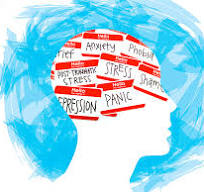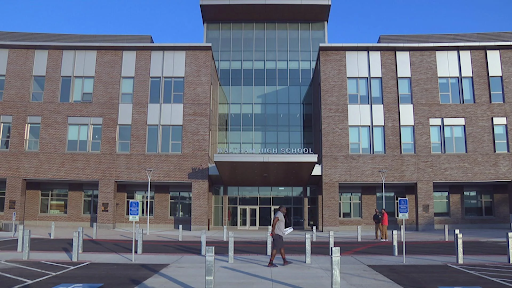
Mental Health is a very current and worrying issue at Waltham High School and around the world. But what is the issue? And how do you deal with the stress and anxiety of our everyday lives?
Mental Health is a widespread health issue that has gotten worse over recent years. Between the pandemic, inflation, wars, and many other challenging circumstances, there are many things for people to stress about. Data shows that, “in 2017, just under 300 million people worldwide suffered from anxiety, about 160 million from major depressive disorder, another 100 million from the milder form of depression known as dysthymia,” according to Institute for Health Metrics Evaluation. Hormones, phones, social media, and many other things can negatively affect a teenagers mental health and cause them to be anxious or sad.
So what do students at Waltham High School stress about?
- Grades
- Tests
- Classwork/Homework
- Deadlines
- Pressure from others
- After school activities
- Friends
Additionally, upperclassmen worry about college and being prepared for life after high school.
“Students can have anxiety about how others feel about them. Everyone wants to be liked by everyone, and to be the best at what they do. But the thing is, nobody will get to live that life, and that truth hurts. The stress of needing to be so perfect and wanting to be so popular definitely has that negative effect,” said WHS Sophomore Derek Dowcett. “Waltham is a very judgmental school when it comes to the students, and I don’t even believe it’s on purpose or meant to be malicious. I think we’ve all just developed bad habits of talking about people and forgetting about how that may make them feel.”
Do our school systems deal with stress and mental health correctly? Is Waltham High School a safe place for these students and do they get the help they need? There are many different views about this.
“I feel like we have come a long way when we are dealing with mental health with students but there is always room for improvement since mental health is such a big umbrella. I think that we have come a long way. I do feel we need some more support, more trained professionals,” says Waltham High health teacher, Ms. Beck, “I think that, especially after Covid, the mental health caseload has become somewhat big. It’s a lot for one adjustment counselor to handle alone. I think that there are teachers that I feel do well with students, that kids can trust to go to when they don’t feel right, and we know who to go to. I do think we have come a long way, but I do feel like we need more professionals to deal with some of the kids.”
Dr. Rendón, associate principal for the class of 2027 at Waltham High School, agrees,“I don’t work specifically in that area, but there are specialists in that area such as school adjustment counselors that do an excellent job. Our guidance counselors are also informed as to how to also work with the specialists in the building. So I believe that: could we do better? Yes. I think we could do better, and we are doing as best as we can given our resources and human capacity as well.”
However, not everyone agrees. Freshman Anya Hersh feels like Waltham High School doesn’t have the right support to deal with mental health issues. “I don’t think they have support in place. I know at my mom’s university, Northeastern, they have these mental health check-ins every one or two months. I think it’s like every month. Each student replies to her personally. She gives a lot of space for that and it’s obviously a university so there’s a lot of students and a lot of work.”
“Students are also given mental health days, where you just take a day off for your mental health and it is covered already. I’m not saying that a lot of people should just take the days off because I know how high schoolers work and people might get carried away, but I think there should be a little more support for students. Like you’re not allowed to leave class, go for a walk, you’re not allowed to be out of the room for more than five minutes. I feel like that just causes a lot of anxiety and stress because people are basically made to just sit in a classroom for like an hour. An hour is not that long but it really turns into five hours in total with a 25 minute lunch break thrown in there. But it still can be really stressful for some students who are anxious about school,” said Hersh.
Mental health days is an idea that is starting to spread globally. The idea is that students can take an excused day to relax and cope with their mental health. The states of Washington, California, and Illinois, among others, allow for students to take mental health days. Certain universities, such as Northeastern, also allow mental health days. At many of these schools the limit is five mental health days though for some that is for the academic year, and for others it is by semester or quarter.
Students agree that WHS isn’t doing enough to support students with mental health. “There are definitely some things put in place to provide support, but I think overall it isn’t too trusted,” says Dowcett. “And students widely feel they won’t be able to get support without their family having to hear about it, or it just being an overall it not being a helpful experience.”
Mr. Wolfson, the current assistant director of school counseling of Waltham Public Schools, agrees with Dowcett that many people are afraid to talk about mental health. “Mental health very often historically and still today has a stigma and sometimes people don’t want others to know that they are dealing with some kind of mental health problem, whether it’s depression or anxiety but it is becoming something that is more understood, understood as far as yes a lot of people do have anxiety,” said Wolfson. “So because maybe there’s more empathy towards it, if this person is feeling like this and this person’s feeling like this and they know that in society a lot of people are feeling this way hopefully that makes it easier to talk about and sometimes that’s the first step to helping to work on it.”
One of the goals for Wolfson and the WHS guidance office is to make mental health something that is talked about at Waltham High School and in the Waltham public school system. “What I hope to do is make it ok to talk about mental health, making it ok to not be ok, and the more strategies that students build to help managing anxiety and recognizing things that may trigger very emotional feelings or depression or things when you know what’s going on you can understand that you can talk about it,” said Wolfson. “Sometimes that is a brief strength in being able to manage stress. Are things going to disappear, are we going to eliminate teen anxiety, no we’re not going to eliminate teen anxiety. But what we can do is make it something that people feel more comfortable talking about, more confident that something can be done about it to help manage.”
Rendón agrees, “I think mental health needs to be part of everyone’s vocabulary, in all languages, we need to name it and we need to understand if we name it what it means or what it looks like. And that’s a learning process.”
Many students at WHS shy away from talking to teachers in fear of their family hearing about it and learning stuff they don’t want their family to know. But is family a contributing factor to stress and anxiety? And do parents overlook mental health issues?
“Parents, it’s such a double edged sword,” says Ms. Beck, “And I think that some parents definitely need to pay attention to it more and realize it’s not a joke. And then I think that there are some parents that can’t every five seconds be with their kids,” said Rendón. “I think sometimes they can basically misinterpret, ignore, not want to see, or are overboarded with other issues.”
Some parents also see mental health issues as laziness. But that’s not necessarily true and is a sad and untrue stipulation.
“Sometimes, behaviors in anxiety and depression may be similar to what people refer to as teenagers being lazy. However, teens actually have a different sleep rhythm which means it keeps them up later and want to sleep in later-which many people mistake for being lazy,” said WHS health teacher Ms. Manganiello. “Also, teens’ schedules are so busy on top of still trying to have fun and being a kid, it can be very overwhelming and stressful for someone at this age, or any age really. However, if it is overlooked, this can negatively affect a student because they could be missing out on resources that could help them such as behavioral exercises, therapy, medication, etc.”
People also believe that social media and phones in general are negatively affecting students’ mental health. But are phones a real issue?
“I truly believe social media contributes (to negative mental health), there’s a lot out there. The messaging in our world seems, to me, very negative. I don’t see much kindness, I don’t see much care for others, and that concerns me deeply,” said Rendón, “That’s not who we are as human beings so that really impacts me and it concerns me and I believe also again our house office, Ms. DeStefano, Ms. Feely, we take such care in messaging the opposite of what we feel our youth are exposed to.”
One solution that came up to deal with this issue was putting in place a more structured phone policy. “We already have a policy. So in terms of working with colleagues, Mr. Cox, the guidance counselor, and I are kind of moving forward with exploring this in our surveys to our staff,” said Rendón. “We will be reaching out to you, the students, and also parents so that we can give it to Principal Braggs. Saying, hey look, this is what people are feeling about how we use cell phones and then analyzing that to see if we want to actually improve and change our policy at the high school.”
Hersh agrees that phones contribute to negative mental health, especially after Covid. ¨I think because of technology and the phones really took a toll on students and students really learned to take their problems to their phones cause they were at home with nothing else to do… I feel like another added layer to that was technology and phones. And I’m not saying I hate my phone, because I definitely use my phone all the time, but it’s I think for students, a pretty big issue.”
“I think during Covid some of the symptoms of anxiety and depression definitely accelerated because there were fewer natural outlets, y’know fewer interactions with staff members and adults in school,” said Wolfson. “Lots of people were under different stressors than they ever were before, between just not having access to the social networks or some students or caregivers finding themselves in positions where from a physical standpoint they maybe weren’t able to stay safe or feel safe.”
“The shuttering of the American education system severed students from more than just classrooms, friends and extracurricular activities. It has also cut off an estimated 55 million children and teenagers from school staff members whose open doors and compassionate advice helped them build self-esteem, navigate the pressures of adolescence and cope with trauma,” reported The New York Times. Covid really changed a lot of things in our school systems and around the world, changing our everyday lives and isolating ourselves from others. Many people wonder if we can ever get back to how we were before Covid, especially mental health wise.
“That was a very unusual episode in the world, it was a global issue. It impacted everyone worldwide and we have to move on. And what does that mean and what does that look like; it will be different for all the different contexts. For me, I think that there are some competencies or some strategies of going back to basics that we all need to do collectively. Things such as self-awareness, things such as self-management, social competencies, and again in my sphere of influence, academic competencies,” said Rendón. “They’re going back to basics of how to socialize, how to say hello, goodbye, how to be kind, how to greet someone by looking them in the face. We’re humans, and we need to go back to human connections and again move away from machines, devices that interfere in our human connections. So I feel yes, we can, I do think that we can, that’s my hope. We need to aim to get back to that social interaction and that warmth that we are able to do.”
But what can teens do to limit and cope with their stress? There are many ways teens can deal with and limit their stress, but not every way will work for every person.
Here are some strategies and coping mechanisms:
- Deep breathing
- Writing feelings down
- Talking to a trusted person
- Listening to music
- Drawing
- Reading
- Use a small fidget
- Time management
- Napping/Resting
- Getting sufficient sleep
- Taking a break
- Staying active/Exercising
- Limiting screen time
- Boxing
- Journaling
- Therapy
- Eating right
- Hydrating
- Organization
- Being honest with yourself and others
- Doing what you love
- TAKING TIME FOR YOURSELF/TREATING YOURSELF
There are many different things you can do to deal with stress and anxiety. Everyone has a different coping mechanism and not all coping mechanisms work for everyone. It’s important to use these coping mechanisms because they really help with anxiety and stress and can help you deal with it.
Waltham High School also has a class called stress management taught by Ms. Manganiello. In stress management you learn about anxiety and stress, causes and methods to cope and deal with it.
Mental health isn’t always one thing though which makes the issue so tricky. Mental health can look so many different ways and it isn’t always anxiety, stress, or depression. There are so many different variables and factors that make mental health complicated.
“Mental health and people that are dealing with mental health, it’s not always visible,” said Wolfson. “Mental health does not always look how you think it looks.”
Waltham high school strives to deal with mental health as best as possible and continues to improve and develop the ways they approach the topic.
“Cause here at Waltham High School, we want to see every child, the whole child,” said Rendón. “The whole child is social emotional learning, it’s also socializing with peers and adults, and of course, how they are accessing their classroom and assignments to be successful. Mental health is a big piece in that whole spectrum of variables. So I can’t predict where you’re all going to go. But I can be confident, in the four years at Waltham High, we will give you these competencies. That’s our goal.”
Mental Health has a lot of different causes, reasonings, and methods to cope with it. Mental Health is a very concerning and complex issue and Waltham High School has to have the right support for the students.
For more information on Mental Health resources at WHS see here: Mental Health Resources





